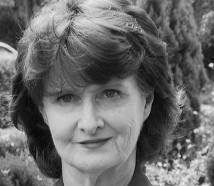- 阅读
- 阅读
- 技巧
- 百科
- 试题
- 文化
- 技能
Eavan Boland, poet, died on April 27th, aged 75
诗人伊万·博兰德于4月27日去世,享年75岁。

But once she was married and the mother of two small daughters, happy if she could jot down just one line or one image, that was not her life. Her days now revolved round cooking, washing up, nappies, feeds; lifting the kettle to the gas stove, setting her skirt over a chair to have it without creases for the morning. They were full of small untidinesses and oversights which assumed huge importance, like the loaf forgotten by the cash register, or washing left wet.
但是一旦伊万结婚了,成为两个小女孩的母亲,她能草草地写下一行字或者一个点子就已经很开心了,可那不是她的生活。她的生活现在围绕着做饭,洗碗,换尿布和喂食;把水壶放到煤气灶旁,把裙子搭在椅子上,这样早上就不会有褶皱了。这些事充满着小的凌乱和疏忽,都很重要,比如把面包忘在收银台前面,或者东西没有洗干。
They were full, too, of hidden satisfactions: a row of cups winking on their saucers, a copper pan well polished, fresh green celery feathers. Much of this was so ordinary that it might have seemed unremarkable. Certainly it was not named in Irish poetry. But ordinariness, "dailiness", was precisely what she wanted to capture. The surfaces of things could barely hold what was under them; just as the small, routine gestures of many couples contained the unspoken steadfastness of love.
它们也充满了隐藏的满足:一排在碟子上闪闪发光的杯子,一个擦得很亮的铜锅,新鲜的绿色芹菜。这些事情中很多都很平常,所以可能看起来不起眼。当然,它不会出现在爱尔兰诗歌中。但是,伊万想表现的就是普通的日常生活。事物的表面几乎无法隐藏它们内部的东西,就像许多情侣的小动作和日常动作一样,包含着不言而喻的爱的坚定。
Other "women's subjects" needed tackling more forcefully. She had no qualms about that. The whole poetic tradition had to be scrubbed and abraded with the wash stones of resistance. So an anorexic torched her witch-body, its "curves and paps" until, "thin as a rib", she could slip back into Adam again, "as if I had never been away". A menstruating woman confronted the moon, "dulled by it/ thick with it…a water cauled by her light…barren with her blood."
其它“女性的议题”需要更强有力的应对。她对此并没有感到不安。整个诗歌传统必须用反抗的磨刀石来擦洗和研磨。一位厌食者点燃了她女巫般的身体,她的“曲线和柔软”,直到“瘦的像一根肋骨”,她就能再次回到亚当的身体里,“就好像从没有离开过”。一个来月经的女人面对着月亮,“变得迟钝/变得愚笨...光倾注在水面上...在空荡荡的地方流着血。”
Shockingly, a wife who believed "I was not myself, myself" in her everyday dutifulness felt herself remade when her husband, coming home tight, split her lip and knuckled her neck "to its proper angle"; and was grateful for his remodelling. Yet the all-too-ordinary often slipped into something else. She was too deeply read in the myths and epics of Ireland for it to be otherwise. The life that was lived in a brick house could still have a visionary quality.
令人震惊的是,一个尽着日常责任,并认为“这不是真正的我”的妻子,在丈夫准点回家,掰开她的双唇,用手将她的脖子按到“合适的角度”后,感觉自己被重塑了,并且对他的改造感到感激。但是这些过于平常的事经常会发生变化。她对爱尔兰的神话和史诗太了解了,以致于无法接受。在砖房中的生活里可能仍然会产生远见卓识。
In "Night Feed", she noticed not only the rosy zipped sleeper, the hard suckling, the silt of milk left in the bottle, but the movements of earth and stars, and the "long fall from grace" as the feed ended. The stopping of the tumble-dryer, like death, began "to bury/The room in white spaces." An old florin, brushed on a shelf, turned into a silver salmon. That everyday life was also not remote from history. But she preferred to call it The Past: a place of shadows, fragments, defeats, rather than heroics.
在《夜间喂食》中,她不仅注意到了玫瑰色的拉链枕木,坚实的吸吮,瓶中残留的牛奶淤泥,还有地球和星星的运动,还有在喂食结束后感到的“长时间的失宠”。烘干机的停止就像死亡一般,开始将“房间埋葬在白色的空间内”。刷洗过在架子上的二先令银币变成了银色的鲑鱼。日常的生活也并非远离历史。但是她更喜欢叫它“过去”:一个充满阴影,碎片,失败,而不是英雄的地方。
The Troubles appeared, through an ancient television set, as "grey and greyer tears" and "moonlight-coloured funerals". Emigration to America was a woman in a gansy-coat on the deck of the Mary Belle, holding her half-dead baby to her. In "Quarantine" the worst year of the famine, 1847, was encapsulated in a couple found frozen, he still carrying her, holding her feet against his breastbone to try to warm them.
通过一个古老的电视机,引出了北爱尔兰暴力问题,有“比灰色更灰的眼泪”,还有“月色葬礼”。“移民到美国”讲的是一名穿着在甲板上的穿着羊毛毛衣的女人,她抱着自己的半死婴儿。在《检疫》中饥荒最严重的一年,1847年,一对夫妇被冻死。他仍然抱着她,把她的脚放在自己的胸骨上,试图温暖它们。
Just two people's deaths, how they had lived, what they had suffered, And what there is between a man and woman. And in which darkness it can best be proved. Such themes were inevitable, for her discovery of her woman's voice in poetry was meshed to her discovery of Ireland. She had left that home at the age of six, when her diplomat father was posted to London and then New York. When at 14 she returned, she did not know the secret language of the country, especially of Dublin, which she grew to love.
讲的就是两个人的死亡,他们是如何生活的,遭受过什么苦难,男人女人之间的联系。只有在那种黑暗中,才能被最好的证明。这样的主题是不可避免的,因为博兰德发现女人在诗歌中的声音与发现爱尔兰有关。因为博兰德的外交官父亲被派往伦敦,然后派到纽约,六岁的她就离开了家。14岁时她回来了,她不知道该国的秘密语言,尤其是都柏林的语言,那是她成长时的挚爱。
As a woman she saluted "Anna Liffey" as the river rose in the hills above her house, flowing through black peat and bracken, then claiming and "retelling" the city for her, putting the pieces together, as she went on trying to. Ireland, though, could still disappoint her. In 1991, when the monumental Field Day Anthology of Irish Writing came out, she was one of only three contemporary women poets included. Furious, she fired up her campaign for women to be noticed and, through poetry workshops, for poetry to be extended to all who had no voices.
在“利菲河”的河水涨到她房子上方的山丘,流过黑色泥炭和蕨菜,身为女人的博兰德向“利菲河”致敬,然后,她继续为自己争取并“重述”这座城市,继续将各个部分组合在一起。但是,爱尔兰仍然会让她失望。1991年,当里程碑式的《战地日爱尔兰文选》出版时,她是当代仅有的三位女诗人之一。愤怒的她发起了一场运动,呼吁人们关注女性,并通过诗歌讲习班将诗歌推广到所有没有发言权的人。
After 1996 a professorship at Stanford, alternating with trips home, allowed her to check on progress from abroad. By the 21st century, to her delight, women poets were flourishing in Ireland, and two new Field Day volumes were devoted to women's writing. Though she never liked to take credit, she had been a voice and a constant encouragement; she had changed the conversation. Make of a nation what you will. Make of the past What you can— There is now A woman in a doorway. It has taken me All my strength to do this.
1996年之后,她在斯坦福大学担任教授,与回家的时间交替,这样她可以了解国外取得的进展。令她高兴的是,到了21世纪,爱尔兰的女性诗人蓬勃发展,两本新的“田野日”专集专门介绍女性写作。虽然博兰德从不喜欢居功自傲,但她却不断地发出自己的声音,不断地鼓励别人;她改变了对话。用你的方式来塑造一个国家,尽你所能来了解过去,现在有一个女人站在了门口。我用尽所有的力量才做到。
来源:经济学人
参与评论